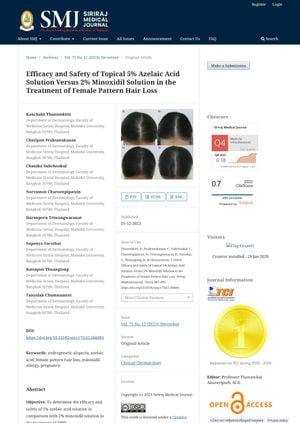Efficacy and Safety of Topical 5% Azelaic Acid Solution Versus 2% Minoxidil Solution in the Treatment of Female Pattern Hair Loss
December 2023
in “
Siriraj Medical Journal
”

TLDR 5% Azelaic acid is as effective as 2% Minoxidil for female pattern hair loss and could be an alternative for those allergic to Minoxidil or pregnant.
The study "Efficacy and Safety of Topical 5% Azelaic Acid Solution Versus 2% Minoxidil Solution in the Treatment of Female Pattern Hair Loss" involved 26 patients with Ludwig grade I or II Female Pattern Hair Loss (FPHL). They were treated with either 5% azelaic acid solution or 2% minoxidil solution twice daily for 6 months. The results showed that both treatments significantly increased hair density and hair shaft diameter compared to the baseline in all cases and visits (P < 0.05). There were no significant differences in hair density and hair shaft diameter changes between both groups (P > 0.05). Both the investigator and patient assessments were comparable between both groups at 6 months. Pruritus was the major adverse effect reported in both groups, but it was mild and tolerable. The study concluded that 5% Azelaic acid solution might be an effective treatment for FPHL, comparable with 2% minoxidil, and could be an alternative treatment for FPHL in minoxidil-allergic patients and pregnant women.














